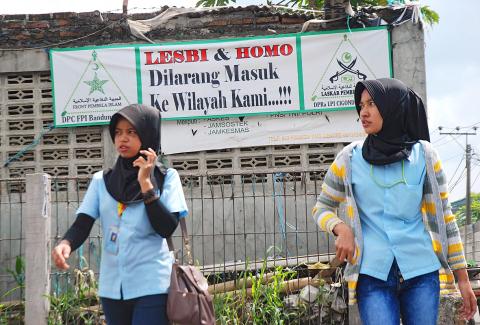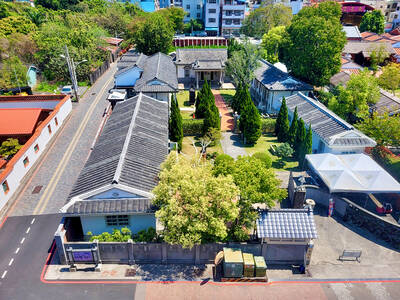The small gay community in conservative, Muslim-majority Indonesia is facing a sudden and unexpected backlash, with ministers and religious leaders denouncing homosexuality, LGBT Web sites blocked and emboldened hardliners launching anti-gay raids.
When a minister criticized counseling services for gay students at a university last month, it triggered a heated media debate and was the start of what activists say has been a sustained assault on gay rights. Hardline Defense Minister Ryamizard Ryacudu this week labeled the influence of the gay community “a threat” and said fighting it was akin to “a kind of modern warfare”.
“It’s dangerous as we can’t see who our foes are, but out of the blue everyone is brainwashed,” he was cited as saying by news Web site Tempo.

Photo: AFP / Timur MATAHARI
The government has shut down a slew of Web sites, ordered TV programs depicting gay lives off the air and demanded all instant messaging apps remove same-sex emoticons — like men holding hands and the symbolic rainbow flag — or face a ban.
Indonesia’s top Islamic clerical body has revived a push for gay sex to be criminalized, saying it is not only “deviant” but against the country’s founding principles, and lawmakers are reportedly considering drafting an anti-homosexuality bill.
Homosexuality is generally taboo in the world’s most populous Muslim-majority nation and gay people have in the past suffered verbal and physical attacks. However it is legal in most of the country, with a notable exception being ultraconservative Aceh province, and homosexuals have mostly been able to quietly get on with their lives. It is unclear why the recent furor has gained such momentum, but it follows a push by religious leaders and conservative politicians to bolster public morality in Indonesia, with crackdowns on prostitution and the availability of drugs and alcohol.
Activists also say that gains made abroad for LGBT rights, particularly the legalization of same-sex marriage across the entire US in June, have heightened scrutiny of Indonesia’s gay community and fanned homophobia.
Much of the concern from senior political figures has revolved around a sense that the LGBT (lesbian, gay, bisexual and transgender) community is seeking to push for changes viewed as contrary to Indonesian culture, like same-sex marriage.
“What’s forbidden [are groups] saying ‘Hey you, let’s be lesbian and gay.’ That’s wrong,” said Vice President Jusuf Kalla, who has requested the UN Development Fund not finance LGBT programs in Indonesia.
IT’S BECOME DANGEROUS
Those working with the gay community say there has been a corresponding spike in harassment, stalking and online abuse, with many fearing radical groups railing against a so-called “LGBT emergency” could become violent.
Radical group the Islamic Defenders Front has stormed boarding houses in the city of Bandung hunting for same-sex couples, while in Yogyakarta radicals massed outside an Islamic school famous for accepting transgender students.
Hardliners have been putting up signs denouncing homosexuality and scuffles broke out this week as police stopped a rally by supporters of the gay community from going ahead in Yogyakarta, several hundred kilometers east of Jakarta.
“It’s getting worse and worse. It’s become dangerous for us,” Ryan Korbarri, general secretary of gay outreach group Arus Pelangi, told AFP.
Staff at the organization have started traveling in pairs and taking different routes home, while another Jakarta-based group Suara Kita shut its distinctive rainbow gate for the first time ever, biding time until the heat dies down.
The unusual wave of anti-gay rhetoric — particularly from senior government officials — has shocked rights activists at home and abroad, with President Joko Widodo being urged to uphold Indonesia’s national motto “unity in diversity.”
“President Jokowi should urgently condemn anti-LGBT remarks by officials before such rhetoric opens the door to more abuses,” said New York-based Human Rights Watch, referring to the president by his nickname.
Despite his silence so far, many still have faith in Widodo, whose past promises to address human rights abuses and champion minority groups have earned him the strong backing of almost all LGBT people in Indonesia, said Teguh Iman from Suara Kita.
“I hope Jokowi will say something about this, and hold us up as equal citizens,” he said.

April 28 to May 4 During the Japanese colonial era, a city’s “first” high school typically served Japanese students, while Taiwanese attended the “second” high school. Only in Taichung was this reversed. That’s because when Taichung First High School opened its doors on May 1, 1915 to serve Taiwanese students who were previously barred from secondary education, it was the only high school in town. Former principal Hideo Azukisawa threatened to quit when the government in 1922 attempted to transfer the “first” designation to a new local high school for Japanese students, leading to this unusual situation. Prior to the Taichung First

Chinese Nationalist Party (KMT) Chairman Eric Chu (朱立倫) hatched a bold plan to charge forward and seize the initiative when he held a protest in front of the Taipei City Prosecutors’ Office. Though risky, because illegal, its success would help tackle at least six problems facing both himself and the KMT. What he did not see coming was Taipei Mayor Chiang Wan-an (將萬安) tripping him up out of the gate. In spite of Chu being the most consequential and successful KMT chairman since the early 2010s — arguably saving the party from financial ruin and restoring its electoral viability —

The Ministry of Education last month proposed a nationwide ban on mobile devices in schools, aiming to curb concerns over student phone addiction. Under the revised regulation, which will take effect in August, teachers and schools will be required to collect mobile devices — including phones, laptops and wearables devices — for safekeeping during school hours, unless they are being used for educational purposes. For Chang Fong-ching (張鳳琴), the ban will have a positive impact. “It’s a good move,” says the professor in the department of

Toward the outside edge of Taichung City, in Wufeng District (霧峰去), sits a sprawling collection of single-story buildings with tiled roofs belonging to the Wufeng Lin (霧峰林家) family, who rose to prominence through success in military, commercial, and artistic endeavors in the 19th century. Most of these buildings have brick walls and tiled roofs in the traditional reddish-brown color, but in the middle is one incongruous property with bright white walls and a black tiled roof: Yipu Garden (頤圃). Purists may scoff at the Japanese-style exterior and its radical departure from the Fujianese architectural style of the surrounding buildings. However, the property